Businesses of Micro, Small and Medium Enterprise (MSME) sector are considered to be one of the major pillars of the economy of a country and in the present age of mammoth economic growth India is at the second position in the world in Micro, Small and Medium Enterprise (MSME) sector with almost 6.3 crore self-dependent units which are solely contributing in the socio economic growth resulting to a contribution of approximately 30% of the GDP and nearly about 50% of the exports thus generating huge acceleration towards innumerable stable employment opportunities.
Despite such huge promises major portion of the MSMEs in India are far away from the reaches of proper business financing from the recognized credit institutions like banks and NBFCs governed by Reserve Bank of India (RBI) and this negativity forces them either to remain under-financed or to run their businesses with informal sources of finances.
The lifeline of a business depends upon the continuous infusion of finance which is considered to be the blood for a steady and successful growth.
So from the view point of the business the continuous induction of finance in the operations in form of corpus and credit facilities for the various operational needs like purchasing of raw materials, payments for the overheads, purchasing and maintenance of machineries etc. for thorough business operation is termed as business financing.
The modern world of businesses has found a very positive attitude particularly within the sector of MSME where the entrepreneurs have developed a massive zeal to achieve unfathomable goals.
To keep this enthusiasm boosted the Government has introduced various facilities of business financing schemes with the support of public sectors banks, private banks and NBFCs.
The initiatives of the Government of India towards the development of the MSME sector has set a standard for every financial institution to introduce various types of lending models as the sources business financing for this emerging sector of MSME which once used to remain neglected because of its informal and unorganized pattern.
There are many such models of business finance that has been introduced by the Government with the collaboration and support of public sector banks, private banks and NBFCs in the last few years which have made the MSME sector capable enough to cross the hurdles of insufficient business finance.
MSME sector can get the right kind of financial support without any secondary collateral securities for the operational expenses of the business or to obtain any infrastructural up-gradation and expansion for the existing business activities under the various business financing schemes of Government of India with the support of public sector banks, private sector banks and NBFCs which are have been given in the following chart:
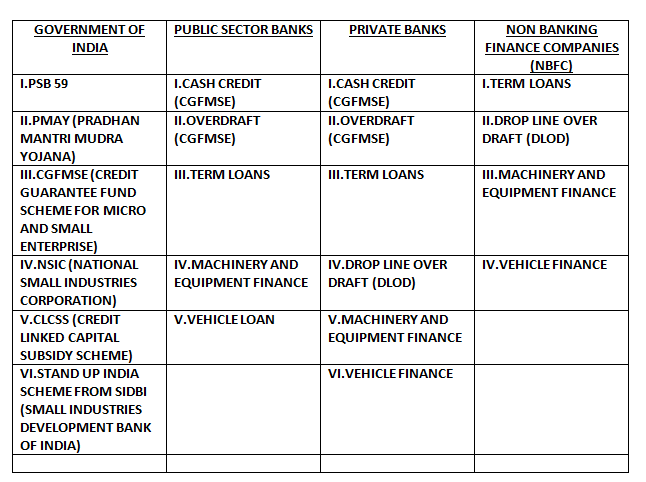
The rate of interest for the business financing plays a major role for every credit facilities that are availed by the borrowers to run the business with smoothness.
The interest burden should always be within the comfort level of the borrower so that the total loan amount gets paid to the lender financial institution without any hazard and the business financing for the particular purpose gets fulfilled as per the demand of the business for which the loan is availed.
Interest rates of Business Financing:
The rate of interest in the present age of banking is dependent on the repo linked rates fixed by the Monetary Policy Committee (MPC) constituted under section 45ZB of the Reserve Bank Act, 1934. The below mentioned chart can make the whole scenario very much clear in respect of the range of interest rates and processing fees, as per the applicability, that are prevailing in the market for the business financing as on 30 September 2022:
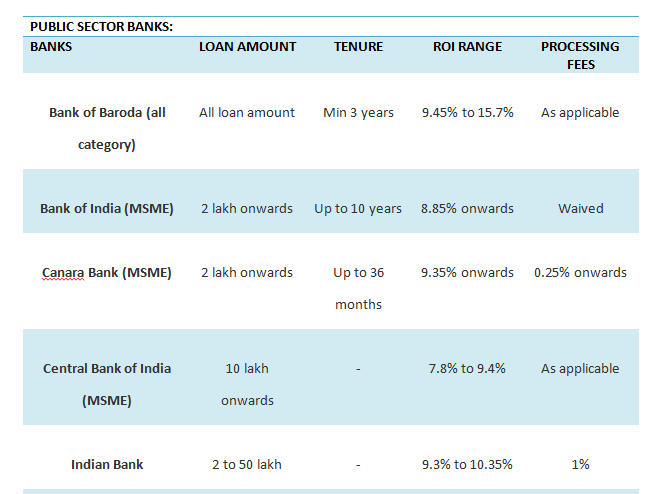
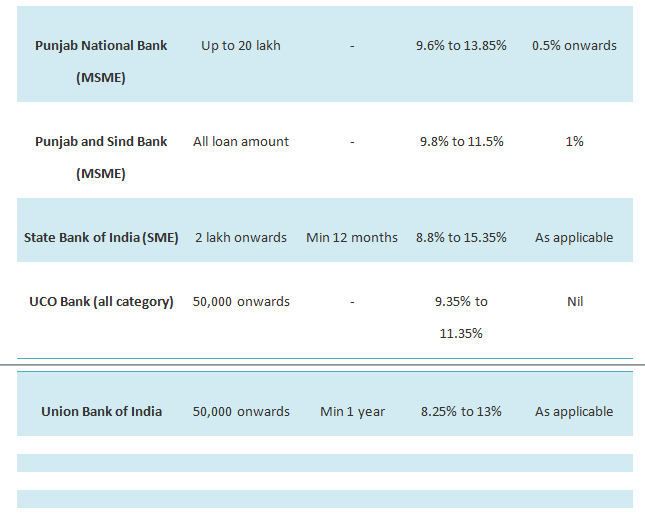
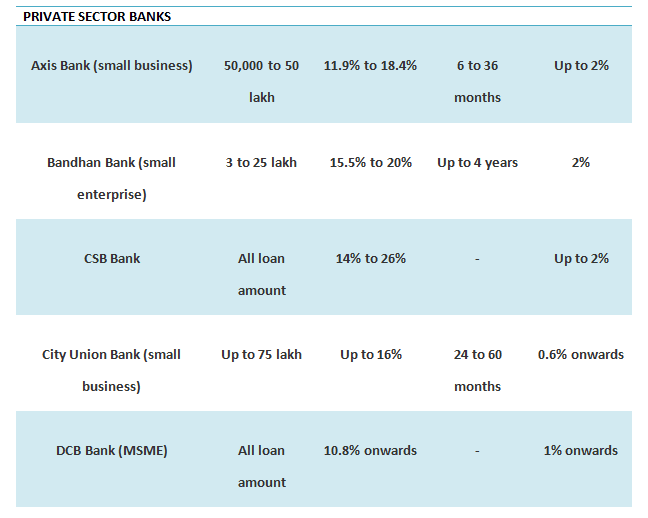
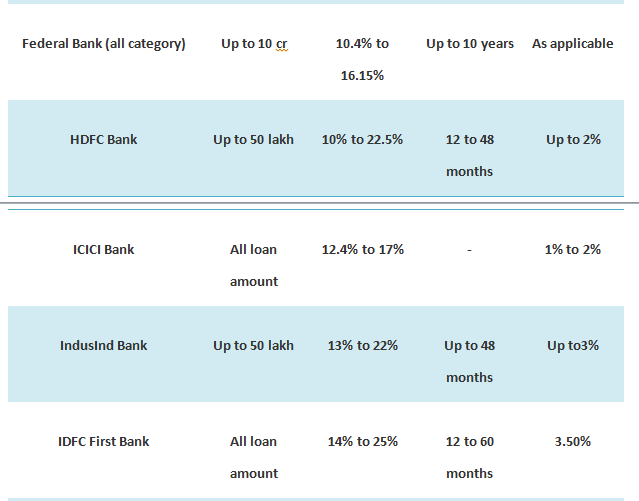
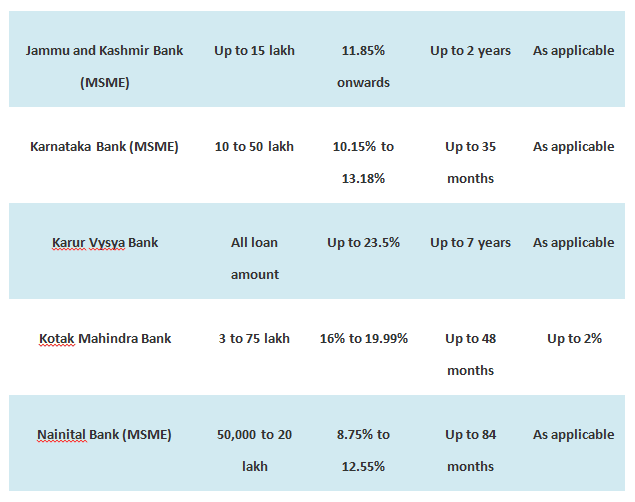
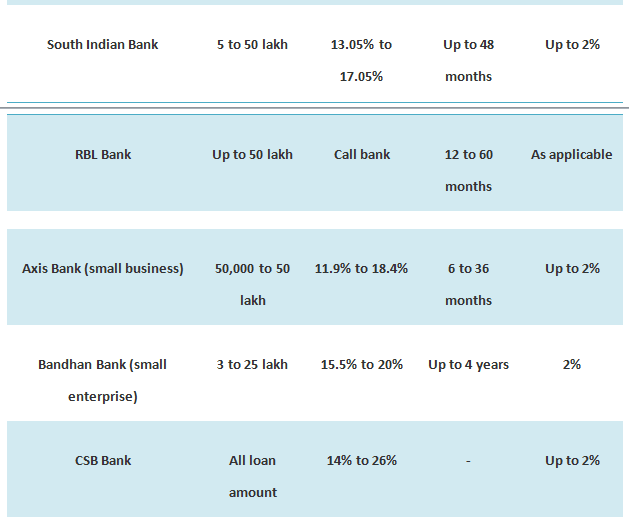
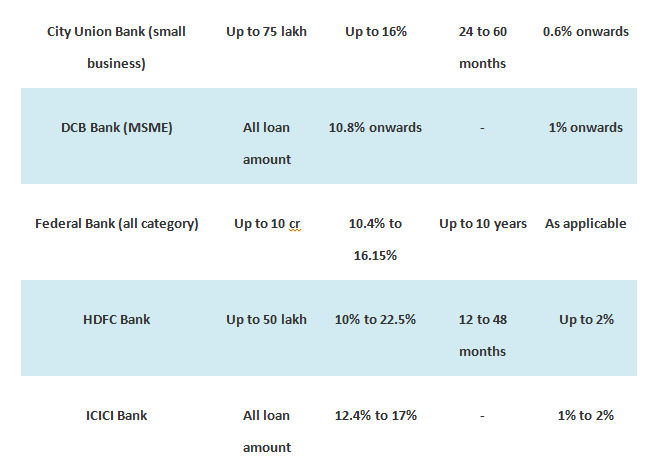
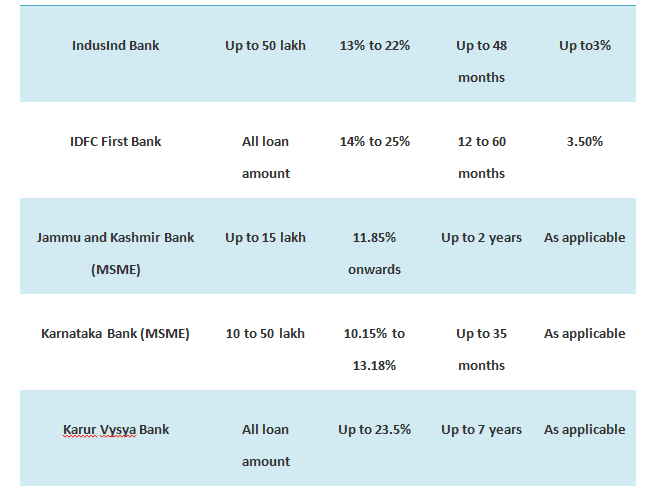
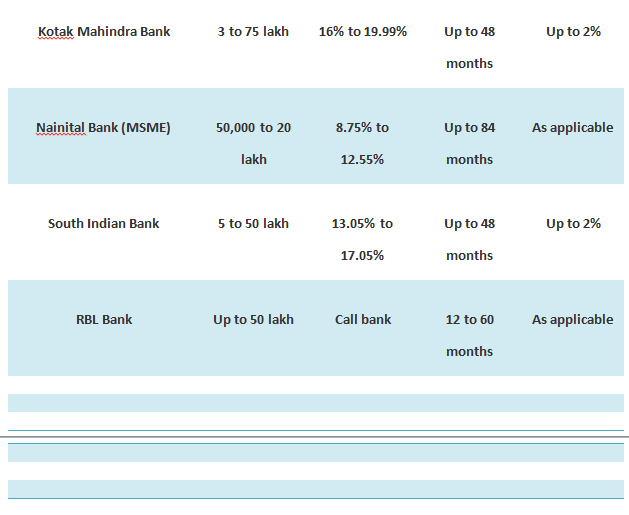
Disclaimer: The above mentioned rates may differ as per the policies of the respective banks with time.
The interest rates applicable for the schemes of Government of India are also affordable as well for the borrowers subject to the return of from the business operations. The under mentioned chart can give a clear picture of the range of interest rates applicable for the various business financing schemes of the Government:

The rate of interests for the NBFCs are a bit at the higher side compared to that of the Government schemes for business financing, public sector banks and private sector banks. The ROI with the various NBFCs present in the finance industry ranges from 15% to 24 % per annum for the loans availed for business financing.
The borrowers of the loans related to their business financing can avail from various schemes of Government of India with the association of public sector banks as well as the variant products of loans which the public sector banks, private sector banks and NBFCs are providing as per the banking policies.
These loans for business financing are selected as per the profile of the applicant and purpose for which it is to be availed.
In most of the situation when it is found that the profile of the applicant is a manufacturer with a gap of working capital loan for the operational expenses required for the business financing then a CASH CREDIT loan is offered particularly by the public sector banks based on the annual turnover with the hypothecation of the closing stocks and debtors.
But if the profile is found to a trader or a service provider with same credentials then the offer for business financing will be made with OVER DRAFT.
In case of private sector banks the offer of OVER DRAFT, DROP LINE OVER DRAFT or TERM LOAN will be placed before the applicant having the same profile as discussed for the business financing.
But in case of application submitted for business financing to any NBFC then either DROP LINE OD or a TERM LOAN can be given to the applicant.
Apart from this, loans for business financing can be availed in terms of machinery and equipment finance or vehicle finance for acquiring any such assets required for the expansion and development of the business.
In general the total banking sector which provides the business financing functions under the governance of RESERVE BANK OF INDIA (RBI) in India constitutes of banks and non-banking financial companies (NBFCs).
Banks can be categorized as the list of SCHEDULE COMMERCIAL BANKS of RBI as follows:
- PUBLIC SECTOR BANKS
- PRIVATE SECTOR BANKS
- SMALL FINANCE BANKS
- PAYMENT BANKS
- REGIONAL RURAL BANKS
- FOREIGN BANKS
As per the Scale Based Regulation (SBR): A Revised Regulatory Framework for NBFCs (the framework) issued by RBI on October 22, 2021, NBFCs are categorised as follows:
- NBFC—BL (NBFC IN BASE LAYER)
- NBFC-ML (NBFC-MIDDLE LAYER)
- NBFC-UL (NBFC IN UPPER LAYER)
- NBFC- TL (NBFC IN TOP LAYER)
The eligibility of an applicant is calculated based on some fixed criteria and documents while applying to avail a loan for business financing from every financial institutions in the country and which are very much same for most of the banks and NBFCs. These parameters for the eligibility calculation been summerised as under.
- Persons eligible to avail business financing can be either self-employed non-professional or a self-employed professional for its business and professions respectively must be a proprietorship firm or a partnership firm or a limited liability partnership company or a private limited company or a limited company.
- In case of self-employed professionals the proprietor or at least one of the partners or directors must possess the certification of professional qualification and proper documented proof supporting the professional practicing.
- The minimum vintage period of the existing business or profession should be at least three complete years from the date of first issuance of trade registration certificate till the date of submitting the application for loan.
- The trend of the profit of the business or profession should be in growing manner at least for the last two financial years and the turnover should also be in upward direction on year on year basis.
- The age of the applicant in case of proprietorship firm should be 22 years and above and the maximum age limit is 65 years on the date of application for the loan. In case of other entities at least one partner or director holding the majority share should match this criterion.
- The entity applying of business financing from the financial institution must possess the income proof under the Income Tax Act, 1961 at least for the last two financial years along with the bank account statement for the last one year.
- If there is any provision regarding the applicability of other taxes like Goods and Service Tax then GST Registration Certificate and the returns of last one year are required for the eligibility calculation of business financing.
On the basis of these above mentioned parameters the total calculation of the loan amount for business financing is processed subject to the positive report of the credit worthiness of the applicant.
If the credit score is below the specified level which in general should be 750 and above as per the credit reports of the authorized credit bureaus like CIBIL, PART OF TRANSUNION, EQUIFAX, EXPERIAN OR CRIF HIGH MARK then the proposal will get denied by the financial institutions.
Read More:





